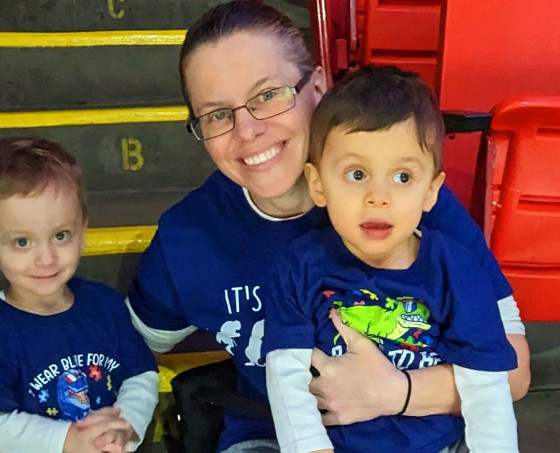- About
- What Is Autism

What is Autism
Autism Spectrum Disorder (ASD) is a complex neurodevelopmental disorder that typically appears during the first three years of life, affecting social communication and behavior development.

Every person with ASD has a unique spectrum of symptoms, ranging from symptoms that require minimal supports to a high-level of support.
Individuals with autism, display deficits in social communication and interactions, as well as present with restricted and/or repetitive patterns of behaviors, interests, or activities (American Psychological Association, 2013). Differences in brain development and functioning relate to the presentation of autism symptoms, such as the way in which an individual may learn, communicate, or engage with other people. For some individuals, the brain differences are known (e.g., genetic conditions) but for many others there is no known cause for autism (Center for Disease Control and Prevention [CDC]).
The level of support needed to help an individual with autism obtain and maintain a high-quality of life varies based on each person’s unique presentation of symptoms. That is, across a variety of domains, including cognitive, social interaction, communication, behavior, sensory, and motor, each person with ASD presents differently. For example, one individual with ASD may rarely use words to communicate, while another may engage in advanced conversational skills. Some individuals with autism may not like to be hugged or touched, while others seek out and enjoy physical touch. People with ASD may process and respond to information in unique ways. In some cases, interfering behaviors (e.g., aggression) may be present. Many children and adults with ASD have indicated that their sensory-nervous systems operate differently (Grandin, 2006). Their senses may be overactive or underactive, resulting in different reactions to things they see, taste, touch, and hear.
ASD is found in all ethnicities, races, and countries, and occurs in more boys than girls.
Autism Spectrum Disorder Characteristics
Individuals with Autism Spectrum Disorder may demonstrate some of these behaviors:
Feelings
Have trouble understanding other people’s feelings or talking about their own feelings.
Touch
Prefer not to be held or cuddled or might cuddle only when they prefer.
Unaware
Appear to be unaware when other people talk to them but respond to other sounds.
Objects of Interest
Absence of showing and pointing at objects of interest (point at an airplane flying over) or fail to look at objects when another person points at them.
Relating to Others
Have trouble relating to others or not have an interest in other people at all or could be very interested in people, but not know how to talk, play, or relate to them.
Inability to "Pretend" Play
Absence of “pretend” play (pretending to “feed” a doll).
Eye Contact
Avoid eye contact and want to be alone.
Echoing
Repeat or echo words or phrases said to them, or repeat words or phrases in place of normal language (echolalia).
Trouble Expressing
Have trouble expressing their needs using typical words or motions.
Sensory Reactions
Have unusual reactions to the way things smell, taste, look, feel, or sound.
Loss of Skills
Lose skills they once had (for instance, stop saying words they were using).
Repetitive Actions
Repeat actions over and over again.
Lack of Interest in Others
Show a strong preference for following their own interests.
Routines
Have trouble adapting when a routine changes.
Early Signs of Autism Spectrum Disorder
The National Institute of Child Health and Human Development (NICHD) lists these five behaviors that signal further evaluation should be pursued.
Babble or Cooing
Child does not babble or coo by 12 months.
Gesturing
Child does not gesture (point, wave, grasp) by 12 months.
Words
Child does not say single words by 16 months.
Phrases
Child does not say two-word phrases on his or her own by 24 months.
Social Skills
Child exhibits a loss or does not progress in their language or social skills.
If your child demonstrates any of these five characteristics it does not mean that your child has ASD. Because the characteristics of this disorder vary widely, your child should be evaluated further.
Please visit the CDC's Developmental Milestones Checklist to Learn More
Autism Services & Options
The basis for selecting a treatment approach should be a thorough assessment of the child’s particular skills, abilities, and needs. Based on the major characteristics associated with ASD, areas that are important to look at when creating a plan include social development, communication, behavior, and adaptive skills.
Researchers agree that early behavioral intervention can greatly improve a child’s developmental trajectory. The earlier autism treatments are started, the better the opportunity for the child to reach his or her full potential. Services for a child as young as 18 months can be provided and may continue throughout the individual’s life. It is important to match the child’s individual needs with potential autism therapies or strategies.

Diagnosing Autism Spectrum Disorder
There are no medical tests for diagnosing ASD. An accurate autism diagnosis is based on observation of the individual’s social-communication skills, behavior, and developmental levels by professional psychologists, physicians, psychiatrists, or neurologists. These professionals may order various tests to rule out or identify other possible causes for the symptoms being exhibited.

Gathering information, such as a developmental history, from parents and other caregivers is very important in making an accurate diagnosis.
It is important to distinguish ASD from other diagnoses to ensure that appropriate and effective educational and treatment supports can be provided as early as possible.

